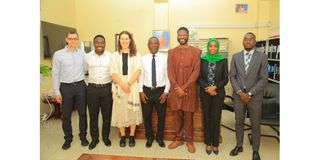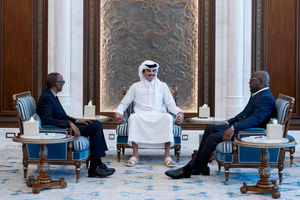Innovative approaches to healthcare: MUHAS and global collaborations

The MUHAS Vice-Chancellor, Professor Appolinary Kamuhabwa, speaking with students from the Stanford Graduate School of Business.
What you need to know:
- The award ceremony, held in Dar es Salaam on March 26, 2025, marked the 30th anniversary of the Beijing Declaration, celebrating women’s contributions to economic and social development.
Dar es Salaam. Embracing innovative solutions while leveraging exchange programmes with universities worldwide are key strategies for enhancing healthcare provision in the country.
The Vice-Chancellor of the Muhimbili University of Health and Allied Sciences (MUHAS), Professor Appolinary Kamuhabwa, made these remarks while addressing a delegation of 30 students from the Stanford Graduate School of Business in California.
The students visited Tanzania to gain insights into the country’s healthcare landscape.
“We are delighted to host these students, as they will have ample opportunities to exchange ideas with our students. They will engage in discussions on the various healthcare innovations being developed here and explore ways to implement effective solutions,” said Professor Kamuhabwa.
He highlighted that MUHAS currently oversees 205 research projects led by its experts, with funding from various international organisations. These projects enable students and faculty members to travel and learn from healthcare systems across the globe.
Nice Nkondora, an intern doctor at the Mloganzila campus, shared how support from MUHAS helped her develop an innovation aimed at assisting individuals facing mental health challenges.
“It all began in my fourth year as a medical student at MUHAS. During my clinical rotations, I observed that many patients sought medical attention at a late stage. My curiosity led me to discover that the delay was primarily due to the stigma surrounding mental health, as well as a lack of awareness and accessibility to care,” explained Nice.
To address this issue, she consulted medical experts and developed an initiative called the Akili Yangu project, which offers online support for individuals struggling with mental health issues. Many patients hesitate to seek in-person assistance due to societal stigma.
Through the Akili Yangu project, individuals can consult mental health professionals, access educational materials, practise meditation and yoga, and maintain mental health journals, among other resources.
Nice emphasised that international exchange programmes provide valuable opportunities to learn, collaborate, and enhance healthcare solutions.

The MUHAS Vice-Chancellor, Professor Appolinary Kamuhabwa, wearing a tie in the centre, poses for a group photograph with students from the Stanford Graduate School of Business.
Cyrus Buckman, the team leader of the visiting Stanford Graduate School of Business students, stated that their visit aimed to understand the country’s healthcare system and how services are delivered, particularly to low-income communities.
“We are eager to learn how people access essential healthcare resources and how MUHAS is preparing its students to meet the nation’s healthcare demands. In the future, we hope to return and contribute, either through investment or collaboration with other organisations in the healthcare sector,” said Mr Buckman.





